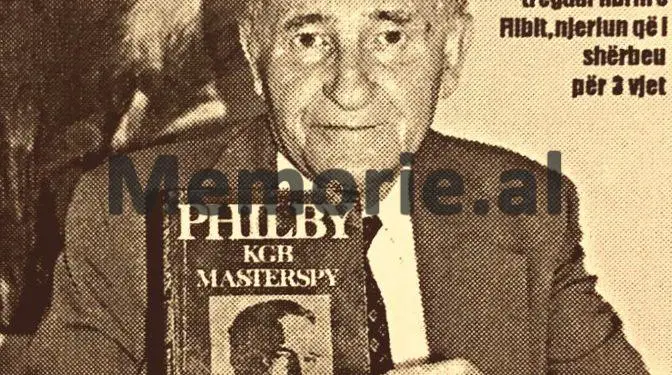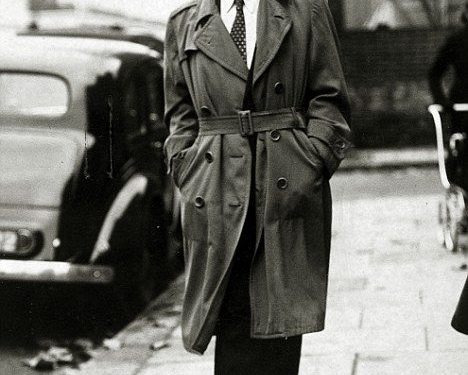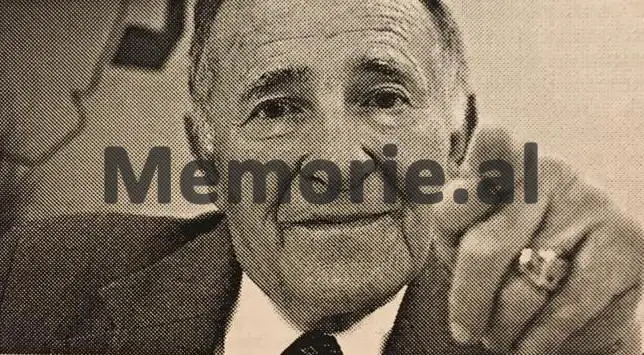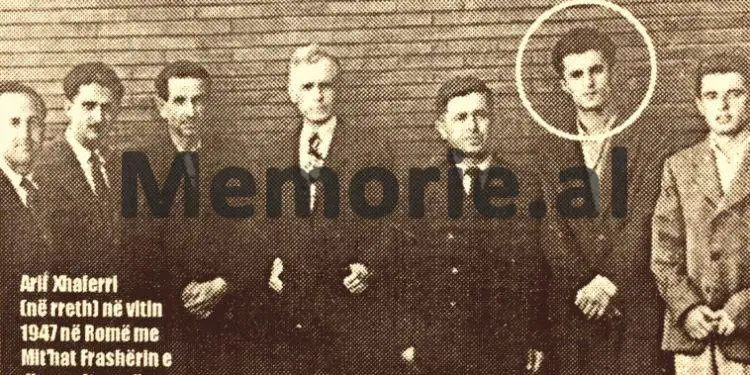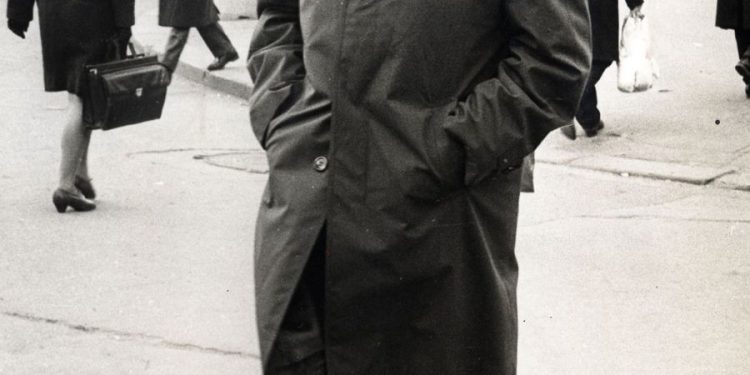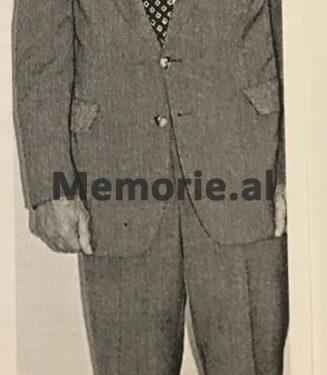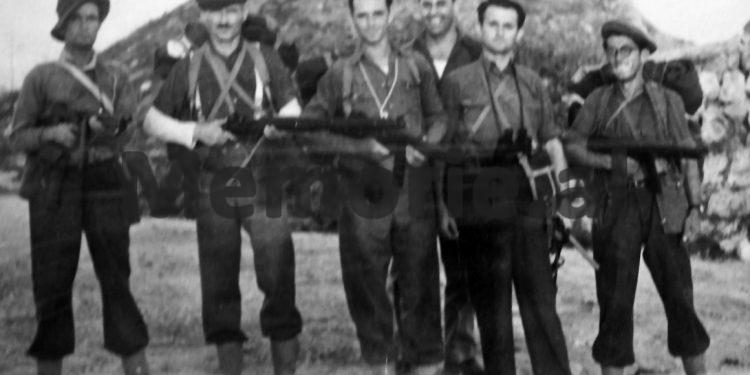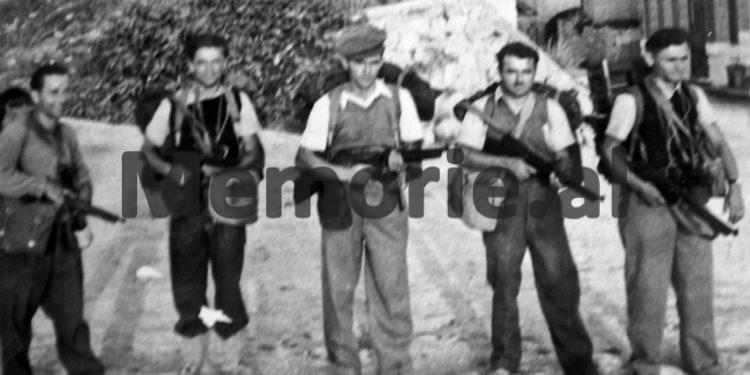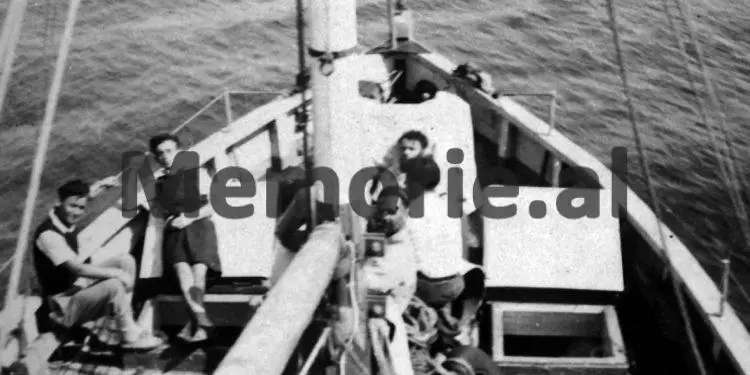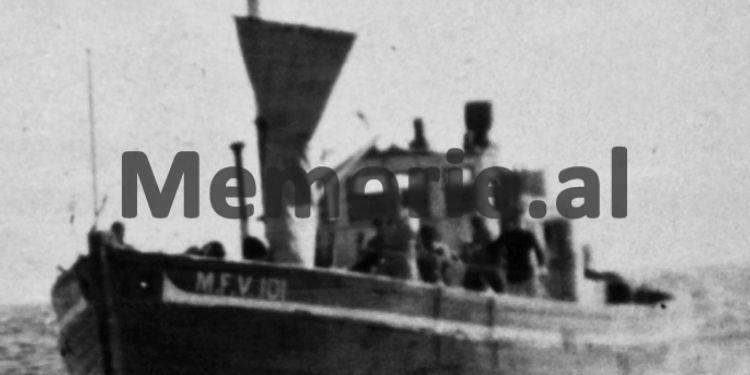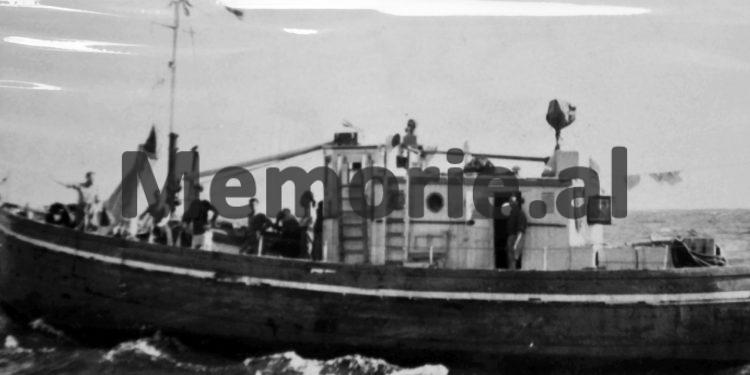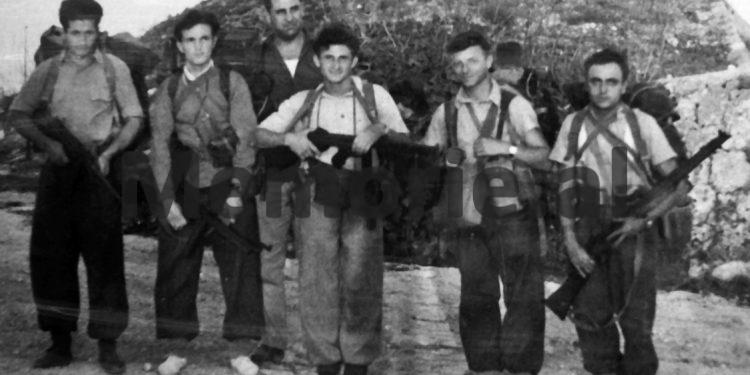Dashnor Kaloçi
Memorie.al publishes the unknown story of Albanian anti-communist groups that were taken by the Anglo-Americans and sent to the secret base in Malta, where they were trained by the British secret service colonel, Harold Adrian Russell, otherwise known as Kim Philby, the well-known agent with high-ranking duties in the Anglo-American Secret Service, which later served the Soviets, serving the KGB with great zeal, where he died in 1988, having worked for many years for the Russians deconstructing much of the operations that the Anglo-Americans had undertaken with their secret services in some countries of the Communist East, such as Albania. Rare testimony of Arif Xhaferri, originally from the village of Sasaj in Saranda, the former ballist who fled Albania in November 1944 and was sent by the “Free Albania” Committee with the group of Albanians trained by Philby in Malta and landed several times in communist Albania. Xhaferri returned to his homeland for the first time in 2005, where he testified for the first time about his adventure with groups of saboteurs in communist Albania where they carried out three landing missions and left some comrades killed or captured alive, such as Sami Bardha from Cologne?!
He left Albania at the age of 16 in November 1944 together with the main exponents of the National Front of Legality and returned to his homeland after almost 50 years of political emigration. Half a century in and foreign with a troubled life having no news of that part of the family he had left in his hometown in the village of Sasaj in Saranda. In 2005, when he was 77 years old, Arif Xhaferri, living in Chicago, USA, came for the first time for a visit to his relatives in Albania and we had the opportunity to meet and interview him. As he at that time, was one of the only three Albanians left alive, from those who half a century ago had served under the orders of the English colonel of the Intelligence Service, Kim Philby. Or rather the man who betrayed his homeland and because of his communist convictions was put in the service of the Soviet KGB by becoming one of the agents who, among other things, deconstructed all Anglo-American operations in communist Eastern countries, including and Albania. Arif Xhaferri testified to us then all his adventure under the orders of Kim Philby from whom he trained, instructed and special tasks in his secret missions in Libya, Korea and Albania, where he landed three times by sea, land and air in years 1948-1951. Before we get acquainted with the interview we received at that time, Mr. Xhaferri, at the beginning of this article we are publishing a short story of his life and the Xhaferri family from the village of Sasaj in Saranda, until the day he was put in the service of the Anglo-Americans.
follows from the previous number
In the first part of this article published in yesterday’s issue, we were introduced to the life story of Arif Izet Xhaferri, originally from the village of Sasaj in Saranda and living in Chicago, USA, who is one of the only three Albanians surviving those who in 1948-1951 were trained by the Anglo-Americans on the island of Malta to land in Albania in order to overthrow the communist regime of Enver Hoxha. According to his testimonies, exclusive to Memorie.al, Xhaferri left Albania in November 1944 together with the main exponents of the National Front and Legality, who settled in the UNRRA camps in Italy. He remained in those camps until 1948, when, with the intervention of Mit’hat Frashëri, he was selected from the group of Albanian emigrants whom the Anglo-Americans took to train at a base in Malta. According to Xhaferi, at that military base which was under the command of the British Intelligence Service Colonel Kim Philby, six groups of Albanian emigrants from: Gjirokastra, Korça, Kolonja, Mallakastra, Vlora, Skrapari and Kurveleshi were trained for three years. The first landing of those groups in Albania took place in October 1948 in the gorge of Dukati in Vlora, where the “Vlora Group” was annihilated by the units of the Pursuit Forces. Also, in the first part of this article we are introduced to a short biography of Kim Philby, the British Intelligence Service officer, who was recruited as an agent of the Soviets spying and deconstructing all the plans of the Anglo-Americans aimed at overthrowing communist regimes of Eastern countries, including Enver Hoxha’s Albania.
Mr. Xhaferri, when and who was the first group to land in Albania?
The first group of Maltese Albanians who left on a mission to Albania was that of Vlora, which landed in the Dukat Gorge in October 1948. Along with that group was the group of Gjirokastra where I was part of the task of radio operator, as well as that of Kolonjë. We all became 18 people.
Did they give you instructions before departure?
Before leaving, the base commander, Colonel Kim Philby, gave us occasional instructions and finally told us: “When you try with the Albanian pursuit forces, do not risk being killed, but surrender, because we have people eating bread at night for night with Enver Hoxha”. From the secret base of Malta, we traveled with a small English submarine where in addition to its captain, there were three other officers, as well as two girls who served us. By midnight when we arrived two or three miles near the Albanian coast, the Vlora group was ordered to get ready for landing. After the submarine came to the surface, Hysen Lepenica, Zagoll Shena, Safet Kaba, etc. headed to the shore in a rubber boat. We from the Gjirokastra and Kolonja groups waited, and 20 minutes after their landing, they informed us by radio that they had been discovered by the Pursuit Forces and were surrounded. The next day we were scheduled to land, but after learning that they had all been killed, we returned to where we had come from, at the base in Malta.
After the Vlora group was annihilated, did the other groups land in Albania?
One week after the annihilation of the Vlora Group, the Kolonja Group and the Gjirokastra Group, of which I was a part, prepared to land in Albania. Our voyage from the secret base of Malta to the vicinity of the coast of Seman, where the landing site was designated, was made by a small English Navy submarine. The two groups were commanded respectively by Xhemal Ibrahimi and Alo Luarasi, while me and Përparim Aliu were on the radio. The submarine left us about 3 miles off shore and from there in a rubber boat we landed around 2pm. The weather was good and we immediately got into the dense forest where we spent that night. The next day some of us climbed through the trees to observe the place around that we had not been discovered by the Pursuit Forces. In the evening, after getting dressed in Albanian police uniforms and with weapons in hand, we set off in the direction of Tepelena, traversing the itinerary: Seman, Cakran, Mallakastër, Fratar, Kalivaç.
What itinerary did you travel on?
We walked in uninhabited areas so as not to be discovered. When we arrived in Luftinjë of Tepelena, the Kolonjë Group left us taking the road to their province, while we stayed for 6 days in a forest near the house of Xhemal Ibrahimi’s aunt, who supplied us with food and cigarettes. According to the instructions we had for every food we received from the villagers we paid gold in cash and this was done in order to give the people the idea that we were indeed sent by the Americans. We could not get anything without money otherwise we would pay it with our heads.
What did you do next?
After 6 days we left in the direction of Gjirokastra, settling on the mountain of Sopot above Lazarat. There we met Haki Kaba’s brother, Rashon, who was a shepherd and supplied us with bread and information. In Sopot we also met Jonuz Bocin, Haki’s cousin who was a judge at the Gjirokastra Military Court.
How could a military judge meet with saboteurs…?!
Jonuzi came and met us in the mountains when it got dark and left at 3 in the morning at his house in Lazarat. After a few days he suggested we leave from there after Captain Ahmet Idrizi with 500 policemen and the Pursuit Forces, had received orders to surround our area. He told us that even in the people the word was spread that saboteurs had come from abroad.
How did you act after that information?
We contacted the center in Malta telling them that our further stay in that country was impossible, and asked for instructions on what to do. The center told us: “Do your best to go to Greece by taking measures so that none of the bases where you stayed are dictated”.
And you left after what the center told you?
Yes, the next morning we left Libohova on the right and according to the instructions of our superiors we crossed the border into Makrikom without being understood at all.
Where did you go after leaving Greece?
We surrendered to the Greek border post in Pocanik where we had debates as they wanted to take our weapons and return us to Albania. This misunderstanding came after we were not told who we were, removing ourselves as deserters of the Albanian army, but then everything was clarified. We gave them our slogan which was “Argj” (Argjirokastra) and they connected with the secret services in Athens. There was Kim Philby who came out on the radio giving us random instructions and specifically instructed us not to show the radio code. After that they received orders from their superiors to treat us as best they could and to meet all our needs, otherwise they would be held accountable.
What did you do next?
After that accompanied by a Greek border team we were taken to Delvinaq, as that area was controlled by the partisan army of the Greek communists of General Marko Vafjadhis. In Delvinaq we were met by a Greek major who in a closed van drove us to Patras where they gave us food. There we were interrogated by a Greek general, who informed us about the death of Mit’hat Frashëri at the Astoria Hotel in New York. There we realized that the Greek general was aware of our mission led by the “Free Albania” Committee. At 9pm we arrived in Athens where the Scottish captain, Grant, was waiting for us. After 30 minutes there came Kim Philby who asked us if we needed anything. That night we slept at the hotel and the next day we were taken to a military airfield where we took a small plane to Malta. A few days later, the Cologne Group came there, which also had not suffered any losses. Thus, ended our first mission in Albania.
What about the second and third missions when you undertook them and how long did they last?
The second mission we did on September 15, 1949 landing on the coast between Lukova and Saint Vasia. Only our group from Gjirokastra landed there as I knew the place, while the other groups landed according to their provinces. While the third mission we undertook on October 2, 1950, parachuting into the mountains of Këndrevica e Kurveleshit. Our plane was discovered and we were ambushed as we landed, but we were able to escape the rugged terrain. While the group of Kurvelesh jumped with parachutes in Vala i Golemit.
What instructions did they give you during this mission?
Unlike the first two missions where we had to gather information about the settlement of the Russians in our country, this time we had the task to meet with as many people and bases to distribute to the people communiqués and leaflets of the Committee “Free Albania” where it was said that; with the help of the Anglo-Americans he would land in Albania. We fulfilled our mission in some way by going to some bases and meeting some trusted people, even though we were being followed everywhere by the State Security. In the second mission we had no losses, while in the third Ramiz Matuka was killed in Bënçë of Tepelena, and Sami Bardha was captured alive with treason in Kolonjë. Seit Piluri and Shahin Dushku from the Korça group were also killed in an attempt by the State Security. On October 23 we left for Greece and after two days we left for Malta. After a while, all the Albanians returned them to England, and they kept me there for another 6 months and then sent me on a mission to the Korean War.
Under what circumstances and why were you sent on a mission to Korea?
In June 1952 an English officer arrived and we flew to Liverpool on a military plane. Two months later I was called to an office where, along with Philbin, there was an American officer with a Scottish captain named Grant. Philby told me: “Arif, from now on you have finished the service with us and you will go to the USA”. That night they introduced me to the American officer and the next day we traveled to Alaska. As soon as we got there, we went to an office where we met a major and a colonel. The American officer who had accompanied me up there left as soon as he introduced me to them. The two officers, after providing me with an American passport, asked me if I would remain loyal to the American state, and I swore to them. Then they said to me, “If need be, will you fight against your homeland?” I replied, “If necessary.”
And what happened to you after that?
The next day I was picked up and boarded on a plane carrying 12 American soldiers, on which we traveled to Seoul Military Airport in South Korea. At that base I stayed for about two weeks of absolute rest and then a civilian came who interrogated me. In English with an American accent, he asked me what I had done by the day I got there. Finally, he asked me where I wanted to serve, at the front or in the background. And I said, “Until I come here, where do you see it necessary?” Since I did not speak English well, I was assigned to the crew of a 12-person bomber.
What weapons did that base have?
There were hundreds of American planes at that base, 44 of which were B-52 bombers, while the others were for transport. I stayed at that base for 8 months and during that time I participated in dozens of flights. The task of our crew was to supply the aircraft with all the materials it needed before launching the bombing aircraft. While during the flight we had other tasks: 2 were the pilots piloting the plane, 2 people were to photograph, 2 others with maps to show the places and objects that had to be bombed, etc.
What treatment were you given there?
The treatment we received there was very good, although most of the time we spent in the ward staying on alert. As a result, I had the opportunity to go out only twice in the cities of Su and Pusan.
Were you ever at risk of being killed?
The danger of being shot by the Koreans was always present, but the biggest danger I went through at the time was when our plane was struck by lightning.
How and when did this happen?
It was January 2, 1953 when this tragedy happened to us from which almost our entire crew lost their lives. After being struck by lightning, the two pilots and two others in front were left dead on the spot by the flames that engulfed them, instantly, while the rest of us jumped with parachutes. The plane crashed in a mountainous area near parallel 36 and only I and another American soldier from the state of Georgia had fractures in our legs from which our parachute got stuck in the tree, while the others had no problems.
How could you escape to return to base?
After 6 hours one of our friends connected by radio to the center and came and picked us up a helicopter to which we signaled with hand electricians. From there I and the other wounded soldier were taken to an American hospital in Okinawa, 110 km. north of Tokyo, where there were about 40 American soldiers wounded.
How long did you stay in that hospital?
There we stayed until February 12, 1953 and that day an American major came and picked us up who took us to the hotel. The next day at 10 o’clock he took us to a military airfield, where he took us on a plane which sent us to a base in the Philippines. After three days, we traveled by another plane to the Fordix military base in Georgia, where the sergeants coming from the war front were gathered. The next day, while I was standing in the barracks of that base, a civilian came and said to me: “Mr. Xhaferri, your service is over. “Thank you for your loyalty to the United States.” Then he asked me where I wanted to stay in the US, to prepare my documents. But I told her I would go to my uncle, Qani Lesko who lived in New York. After getting his name and address, he gave me an address in New York where I had to show up after a week and his phone number, telling me that for any problems I should call him. I broke up with him and headed to New York to my uncle’s house, whom I had not seen since 1948 when we were in Italy camps. A week later I went and showed up at the office where I was addressed where I found a major and two civilian girls. After I was given my passport and military ID, they gave me the salary of $ 5,447 that I owed from military service, thanking me for my loyalty to the United States. I greeted them and left for my uncle’s house where they were waiting for me and many friends who had come to meet me.
Xhaferi: My fierce conflict with Philby in Malta
Shortly after returning from the third mission in Albania, Arif Xhaferri had a fierce conflict with Colonel Kim Philby, who was also the commander of that base. In this regard, he recalled: “After we prepared in writing the usual reports from our third mission in Albania, by order of Philby they removed all Albanians from the base and sent them to England. There were only five of us left: me, Turan Aliko, Muharrem Hitaj, Pëllumb Sino and Ahmet Kuka. We stayed another three weeks later. One day after he called us to the office where two other English colonels were, Philby told us: “We will take you back on a mission to Albania, being divided into groups of 2 Englishmen and 2 Albanians”. I objected by telling them that neither we knew English well nor they knew Albanian, so that could not be done because we could not get along with each other and we would be killed in vain. Philby insisted he was ordered and not discussed. I told him we were not African captives to be treated that way, but we had gone there of our own free will as volunteers. And at the height of my nerves I pushed the table by throwing it at his chest. My companions were frightened and said, “What have you done to us, Arif?” After that I immediately went outside and, on a motorcycle, I set off for the city stopping in front of a cinema. Shortly afterwards, two officers arrived and picked me up, telling me that Mrs. Holldi, the secretary of the Malta Intelligence Service office, was looking for me. I met him and said the same words I had said to Philby.
The book “Philby KGB Masterspy” published in London in ’88: How did the Anglo-American operations in Albania fail?!
The book “Philby KGB Masterspy” by Phillip Knightley, published in English in 1988, gives a full account of all of Philbit’s agency activities in favor of the Russians. Regarding the events in Albania, the book reads, among other things: “SIS and the CIA collaborated on several operations in the 1940s and’ 50s to penetrate the Soviet Union and destabilize the republics of the Soviet bloc. The most infamous and with the biggest losses was the operation in Albania. In 1948 the British and American governments had sanctioned the idea of disintegration of the Soviet Bloc, snatching a country from Moscow control aimed at the domino effect theory. The idea was to infiltrate this country with trained agents to organize a campaign that could lead to a fierce civil war. A lot of preparatory work was done to select the country and it was finally decided that Albania, the weakest and smallest socialist state, could offer all the chances for success. Enver Hoxha’s regime was not completely stabilized, the Germans left, but Albania had problems with reconstruction, while King Zog was in asylum in Cairo and many of his supporters remained in place. Plans advanced, Britain secured Malta as a base for mission ships, the Americans secured funds and weapons. Hundreds of migrants were trained at a Maltese base. In 1973 I met one of the SIS officers who had helped with the treatment. He recalls: We settled in a base in Corfu, called Dhasja. In December 1949 the first 6 infiltrators were sent. Two days ago, we received a signal from the group according to which they had established contacts with the King’s supporters. Four others were sent, but a fifth infiltrator was shot by an Albanian motorboat. Then just silence. They did not inform us until we received a message from the military mission in Athens which had information that all the groups had been captured as soon as they arrived. One of the agents returned, but had problems with the Greek border guards who thought he was an Albanian agent who wanted to enter Greece and who told us they wanted to be informed about our operations. We were called to London and there we were told that an investigation had been launched to find out who had deconstructed them and that for that year the operation had been suspended. /Memorie.al




